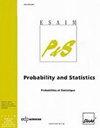𝕃p solutions of reflected backward stochastic differential equations with jumps
IF 0.7
4区 数学
Q4 STATISTICS & PROBABILITY
引用次数: 0
Abstract
Given p ∈ (1, 2), we study 𝕃p -solutions of a reflected backward stochastic differential equation with jumps (RBSDEJ) whose generator g is Lipschitz continuous in (y , z , u ). Based on a general comparison theorem as well as the optimal stopping theory for uniformly integrable processes under jump filtration, we show that such a RBSDEJ with p -integrable parameters admits a unique 𝕃p solution via a fixed-point argument. The Y -component of the unique 𝕃p solution can be viewed as the Snell envelope of the reflecting obstacle 𝔏 under g -evaluations, and the first time Y meets 𝔏 is an optimal stopping time for maximizing the g -evaluation of reward 𝔏.𝕃p带跳跃的反射后向随机微分方程的解
给定p∈(1,2),研究了一类具有跳跃的反射后向随机微分方程(RBSDEJ)的𝕃p -解,该方程的发生器g在(y, z, u)中是Lipschitz连续的。基于一般比较定理和跳跃过滤下一致可积过程的最优停止理论,我们证明了这类参数为p可积的RBSDEJ通过不动点参数有唯一𝕃p解。独特的𝕃p解的Y -部分可以看作是反映障碍在g -评估下的斯奈尔包络线,Y第一次满足是奖励的g -评估最大化的最佳停止时间。
本文章由计算机程序翻译,如有差异,请以英文原文为准。
求助全文
约1分钟内获得全文
求助全文
来源期刊

Esaim-Probability and Statistics
STATISTICS & PROBABILITY-
CiteScore
1.00
自引率
0.00%
发文量
14
审稿时长
>12 weeks
期刊介绍:
The journal publishes original research and survey papers in the area of Probability and Statistics. It covers theoretical and practical aspects, in any field of these domains.
Of particular interest are methodological developments with application in other scientific areas, for example Biology and Genetics, Information Theory, Finance, Bioinformatics, Random structures and Random graphs, Econometrics, Physics.
Long papers are very welcome.
Indeed, we intend to develop the journal in the direction of applications and to open it to various fields where random mathematical modelling is important. In particular we will call (survey) papers in these areas, in order to make the random community aware of important problems of both theoretical and practical interest. We all know that many recent fascinating developments in Probability and Statistics are coming from "the outside" and we think that ESAIM: P&S should be a good entry point for such exchanges. Of course this does not mean that the journal will be only devoted to practical aspects.
 求助内容:
求助内容: 应助结果提醒方式:
应助结果提醒方式:


